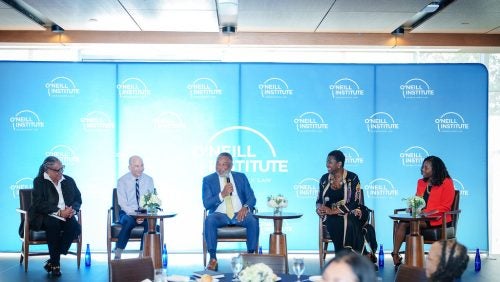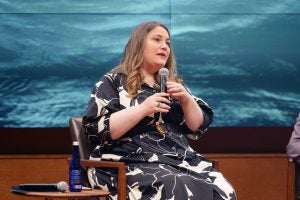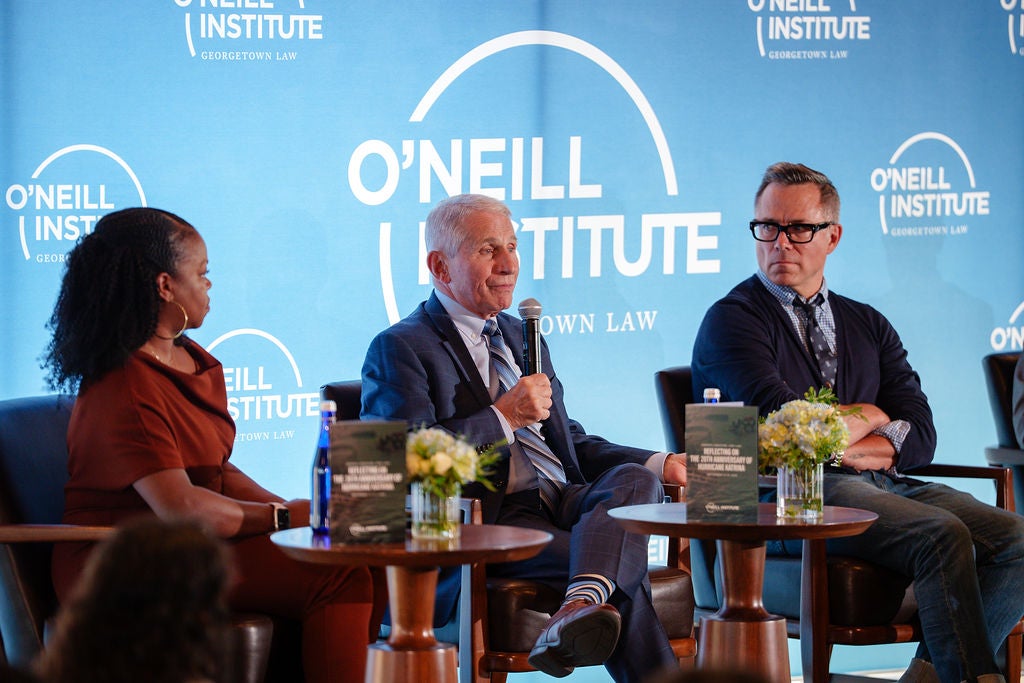O’Neill Institute Hosts Symposium to Commemorate 20th Anniversary of Hurricane Katrina
September 22, 2025

Professors Michele Goodwin (second from right), O’Neill Institute faculty director, and Lawrence Gostin (second from left), founding faculty director of the O’Neill Institute, joined national and global health leaders for the armchair plenary session “Plenary Lunch: Memory, Medicine, and Law: Lessons from Katrina.”
Leading scholars, legal practitioners and public health experts gathered at Georgetown Law September 11-13 to reflect on the 20th anniversary of Hurricane Katrina and the disaster’s enduring impact on law and society.
The multiday “Memory, Medicine, and Law: Reflecting on the 20th Anniversary of Hurricane Katrina” convening was hosted by the O’Neill Institute for National and Global Health Law. During wide-ranging panel discussions and plenary sessions, speakers addressed lessons in disaster response and management and contemporary issues at the intersection of public health and the law, including incarceration, environmental justice and reproductive rights.
“Public health is just a lens to see the project of destroying equal voices [and] equal representation … in democracy,” said Dean Dayna Bowen Matthew of the George Washington University Law School during Friday’s “Democracy and Health” panel. “We have never seen [democracy] under attack as we see it today, whether it’s the courts, the destruction of the administrative state, the destruction of legislative policies.”

Democracy Forward President and CEO Skye Perryman, L’07, reflected on her experience volunteering in New Orleans after Hurricane Katrina.
Matthew was joined in discussion by Katie Keith, L’12, director of the O’Neill Institute’s Center for Health Policy and the Law; Todd A. Cox, associate director-counsel of the Legal Defense Fund; Skye Perryman, L’07, president and CEO of Democracy Forward; Professor Bryan L. Sykes of Cornell University’s Brooks School of Public Policy and moderator Isabella Cueto of STAT News.
The speakers reflected on the lessons in disaster management learned in the aftermath of Hurricane Katrina and contemporary public health challenges, such as the recent firings of civil servants from agencies including the Centers for Disease Control and Prevention and the broad healthcare spending cuts enacted by the 2025 Budget Reconciliation Act.
“Now, even in the aftermath of Hurricane Katrina, dozens of years later, we just witnessed in Texas the devastating effects of yet another natural disaster that claimed lives unnecessarily,” Sykes said. “It’s as if what we learned from Hurricane Katrina isn’t really being inscribed into social policy and into action.”
A ‘bulwark’ against overreach

Dr. Anthony S. Fauci (center), former director of the National Institute of Allergy and Infectious Diseases, spoke about combating health misinformation during the closing plenary.
“The rule of law … is really still the bulwark against the overreach which would destroy completely our democratic system,” Cox said in response to a question about the role of lawyers and the courts in checking executive overreach.
Perryman, who as a Georgetown Law student volunteered in New Orleans following Hurricane Katrina, recalled how recovery efforts were shaped by racial and social inequality and barriers in access to federal disaster aid. “It looked like I was visiting a place that had just been hit by the hurricane because of the lack of access, the structural barriers, racism, inequality and injustice and a failure of the government to properly respond,” she said of volunteering more than six months after the hurricane, which made landfall in August 2005.
Perryman also underscored the role of grassroots and community advocates in challenging injustice and executive branch overreach in the court system today.
“When powerful institutions have pulled back, people have stepped forward to utilize their rights in court,” she said, noting that some 400 lawsuits have so far been brought against the current presidential administration. “We are living right now in what has been the largest and most successful litigation effort against an executive branch in United States history.”
Other speakers included Dr. Anthony S. Fauci, former director of the National Institute of Allergy and Infectious Diseases and O’Neill Institute distinguished senior scholar, who spoke on the closing plenary session about combating health misinformation and Georgetown Law Professors Vida Johnson and Paul Butler, who discussed the intersection of detention and public health on the panel “Policing, Carcerality, and Public Health.”
Click here to view a full recording of the symposium’s first three panels, “Reproductive Justice and The Roberts Court,” “Democracy and Health” and “Epigenetics: Carrying The Weight of Trauma In Our Genes: Whose Lives Matter?” as recorded by C-SPAN.